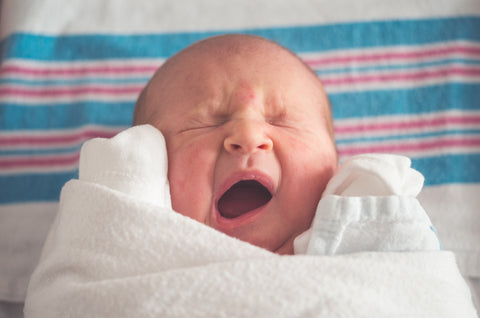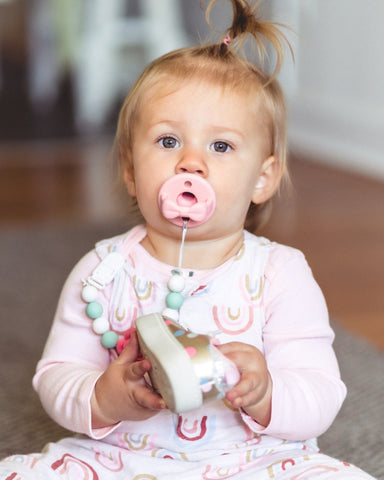
The sweet lullaby of a sleeping baby is music to any parent’s ears. Getting to that peaceful moment can often feel like a never-ending quest, especially during your baby’s first months. Parents know all too well the struggle of sleepless nights and comforting a fussy baby.
For first-time parents, bedtime with a baby can be stressful. Learning how to soothe your little one takes a lot of trial and error. When they finally drift off to sleep, you might find yourself worrying about your baby. Anxiety about your little one’s safety during sleep is a common and valid parenting fear.
Whether it’s fussiness or anxiety keeping you and your little one awake all night, a pacifier could be the answer! These tiny silicone saviors provide comfort and safety during sleep to your little one. You’ll rest a bit easier with a content, snoozing infant sucking on their binky.
So, let’s take a look at the benefits of pacifier use during sleep! We’ll look at their potential safety benefits, how a pacifier comforts infants, and then answer some common questions!
Do Pacifiers Prevent SIDS?
Sudden infant death syndrome (SIDS) is one of the leading causes of infant death and most often occurs during sleep. Experts still don’t know exactly what causes this or how to prevent it. Because of the lack of answers, this syndrome is a common cause of parental anxiety.
Experts think that pacifiers could potentially reduce the risk of SIDS. Although research is still ongoing, many studies have linked pacifier use during sleep to reduced occurrence of SIDS. The exact reason why is still unclear, but the relationship has been repeatedly observed.
Some potential reasons pacifiers help reduce SIDS are:
-
Sucking on a pacifier pushes babies’ tongues forward, helping keep their airways open during sleep. They are less likely to suffocate on their tongue, and their airways
may be less likely to collapse.

- The sucking motion may keep babies breathing. If they’re sucking, they’re breathing. Babies may be less likely to stop breathing when using a binky.
- Pacifier use may keep babies more aware during sleep. The risk of SIDS may be higher when babies enter deep sleep, so sucking on a pacifier may encourage lighter sleep. If there’s a blip in their sleeping pattern, like disrupted breath, they’re more likely to wake up.
- Binkies may encourage babies to stay on their backs during sleep. When a baby rolls over while sleeping, they’re likely to suffocate. The bulky pacifier handle can make it difficult or impossible for a baby to roll over.
Even if the reasons aren’t entirely clear, the observed relationship between reduced risk of SIDS and pacifier use can ease parental anxiety. Pacifiers are a cheap and accessible safety tool that can help lower your stress. You’ll sleep better with an extra helper keeping your infant safe!
Soothing to Sleep with Binkies
Besides their potential safety benefits, pacifiers are soothing warriors. Pediatrician Harvey Karp says that there are 5 S’s to soothing a fussy infant: side or stomach position, swaddling, shushing, swinging, and sucking.
Shushing and rocking can help get a baby to sleep, but what do you do when they wake up right when you put them down? Swaddling may be a great tool at first but becomes a suffocation risk when your baby can roll over. A white noise machine can substitute for shushing, but it may not be effective for all babies.
Pacifiers safely and effectively allow babies to suck while sleeping. This method of soothing can be invaluable to parents trying to soothe their baby to sleep. Binkies are sleep-saving tools that can make bedtime a breeze.
Here’s how a pacifier can be your secret weapon to soothing:
- Sucking has an innate calming effect, instantly soothing frayed nerves and helping your baby drift into slumber. Rhythmic sucking can signal to your baby that it’s time to wind down and snooze. It’s like a built-in sleep cue!
- If you’re breastfeeding, then having another option for your baby to suck on when they need soothing helps you rest and recuperate.
- Incorporating a pacifier into your baby’s bedtime or naptime routine can create a comforting association. A consistent routine is essential for your infant’s development! Repeat pacifier use helps your baby associate the binky with sleep.
- A soundly sleeping baby means parents and caregivers also get well-deserved rest. You’ll be at your best for your baby when you’re also well-rested!
The Big Binky Questions
1. Do I need to replace the pacifier when it falls out of my baby's mouth during sleep?
If your little one isn’t crying without their binky, there’s no need to interrupt your little one’s sleep! Studies have shown that the safety benefits for pacifiers and SIDS are still present even if their paci falls out. You also run the risk of your little one developing broken sleep patterns or dependency on their pacifier by constantly replacing it when they don’t need it.
2. When should I give my baby a pacifier?
It’s best to limit your baby’s binky to naptime and bedtime to build a sleep association and reduce the risk of dependency. However, they can be great tools for reducing stress and pain in other situations. Check out our breakdown of pacifier tips, tricks, and hacks to learn more about when a binky can help you out!

3. What are the risks?
Some potential cons do come with pacifier use, but they can all be avoided by knowing when to give your baby a pacifier and when to start weaning. Most potential cons are age-dependent, like dental issues or breastfeeding trouble. Other cons, like safety issues, come with choosing an unsuitable size or model or incorrect cleaning.
4. How do I choose the right pacifier?
When shopping for a binky, keep in mind the size, shape, and safety concerns. Make sure you choose an infant pacifier for babies and a toddler pacifier for older kiddos. Always choose a one-piece model rather than a two-piece to reduce choking hazards.
And, be patient! Some babies are picky about material, shape, and more. You may try a few models before finding one your infant will like.
If you’ve decided a pacifier is right for you, check out our selection of high-quality pacifiers!
5. When should I wean my baby off the binky?
Weaning is a daunting task, especially if your little one loves their tiny silicone friend. There are lots of different recommendations for good ages to begin weaning based on potential developmental risks. The most important part is choosing what’s right for your little one.
For more information and tips, feel free to read our practical guide to pacifier weaning.
Embracing Pacifiers for Sweet Slumber
Pacifiers aren’t just silicone accessories! They’re sleep superheroes. These tools provide comfort to your infant, signal sleepiness, and give everyone in the house a chance to catch some Zzz’s. And, they may even help your infant slumber safely!
So, if you're a parent in need of more restful nights, don't hesitate to embrace the binky and let it work its magic. A well-rested family is a happy family, and that's something we can all sleep soundly about.

Leave a comment